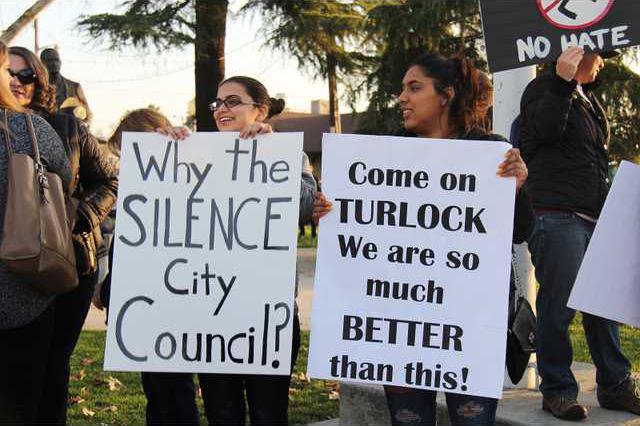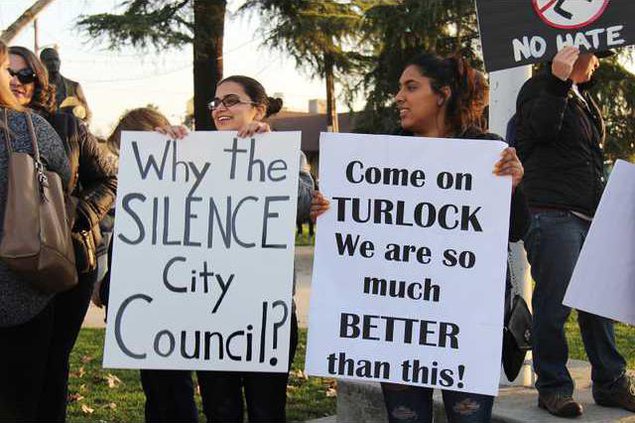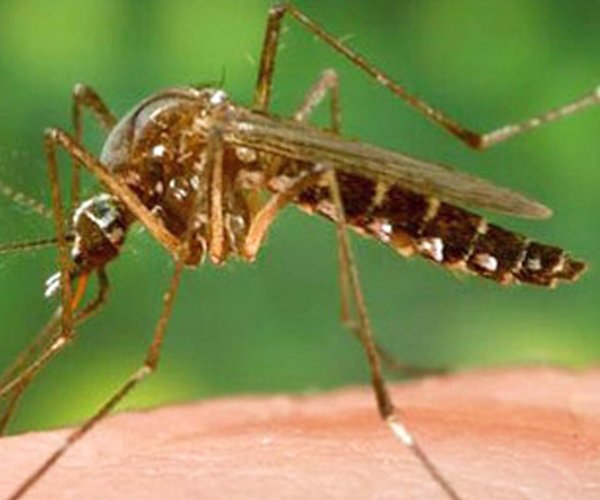Four months after the Coalition Against Hate gave the Turlock City Council a standing ovation, the group marched on City Hall, frustrated that the town’s government hasn’t adequately enforced an anti-hate resolution adopted in September.
The coalition, consisting of 10 local, bipartisan progressive groups, originally formed in September after Turlock resident Danielle Reyes noticed street signs and utility poles had become papered with stickers promoting white supremacy. When Reyes and others addressed the City Council about the issue on Sept. 12, the City alone had taken down at least 100 of the stickers on private property. Reyes, her husband and a group of volunteers also worked tirelessly for hours to take down even more stickers, she said at the time.
At their Sept. 26 meeting, the City Council adopted the “Not in Our Community” resolution in response to the stickers, opposing bigotry, hate-based groups and hate-based crime of all kinds in the city.
Unfortunately, the resolution hasn’t stopped much, with Reyes alerting the City Council at their Tuesday meeting that even more stickers have popped up around town recently. Before the meeting, Reyes and other members of the Coalition Against Hate marched from Central Park to City Hall, chanting for the Ku Klux Klan to “go away,” and that the City Council’s “silence is violence.”
Coalition Against Hate member and Turlock resident Jordan Alvarado immigrated to Turlock from the Philippines when she was eight, she said, and feels that racism has always been an issue for her.
“I have the right to feel safe just like everyone else. This isn’t about the stickers – it’s about legitimizing their ideology and scaring marginalized people away from a public place,” said Alvarado.
Alvarado also attends Stanislaus State, where in recent months student Nathan Damigo has made headlines for his involvement in and planning of several white supremacist rallies around the country, and for placing alt-right posters promoting the ideology throughout the campus.
Neither institution, the Turlock City Council nor the university, have responded to these instances adequately, despite proclaiming they are against hate, said Alvarado.
“This is about the social institutions that aren’t taking action against it, and therefore being complicit,” she said. “The Council passed a resolution, and they have yet to take any action against the stickers. That comes at the cost of our own safety.”
Others in the coalition addressed the City Council Tuesday night, wondering why more funds have not been allocated to address the problem that is running so rampantly throughout the city.
Turlock resident Cathy Doo held up a poster for the City Council that was discovered at Stanislaus State. It read “NO means NO #mybordersmychoice” and was placed to cover another poster that read “All immigrants are welcome.”
Coalition member and Turlock resident Donna Endsley told the council that she was disappointed to find that there wasn’t an insert announcing the city’s anti-hate resolution in her monthly water bill, as had been promised. Mayor Gary Soiseth told her that the council would discuss inserting an announcement at the next City Council meeting, scheduled for Feb. 6.
To address the citizens’ concerns, Police Chief Nino Amirfar gave a presentation to show that the Turlock Police Department has been doing all they can to take down the stickers in a timely manner, in collaboration with the City Parks, Recreation and Facilities and Municipal Services departments.
To date, TPD has removed 39 stickers themselves, most of which are on the north side of town near Taylor Road. Amirfar told the coalition that the best way to apprehend the individuals is to help TPD keep an eye out for those posting the stickers, as there is a shortage of police officers right now.
“Continue to notify us and make us aware,” said Amirfar. “The bottom line is that the city of Turlock has always welcomed diversity as long as I’ve been here for over 35 years…we love our community, we love the diversity in our community and our council has made it very clear, as they speak for the city, that ‘Not in Turlock.’”
Councilmember Amy Bublak asked Amirfar if TPD could install pole cameras, used for outdoor video surveillance, near the intersections that have been targeted the most by the perpetrators, but Amirfar was unsure if the equipment would be granted to the city department by the federal government since the posting of the stickers is not a felonious act.
Four and a half months after bringing the hate propaganda to the Council, Reyes is still hoping for answers and enforcement on an issue that continues to plague her family. She told the Council she’s frustrated that it has been up to community members to take action against the stickers.
“This is infringing harm on people and it’s a civil rights violation,” said Reyes. “Not in my town.”
“We understand. We want to do something about it. We want to change it. We want to stop it,” said Councilmember Gil Esquer. “It’s maybe a slow process, but it is being worked on. Please understand that.”
Soiseth explained that the Council entrusted enforcement of the resolution to the police department, and that TPD has done “a good job so far.”
“There needs to be more education…whether it be not just inserts, but other ways of communicating and making sure that the community knows about these resolutions,” said Soiseth.





